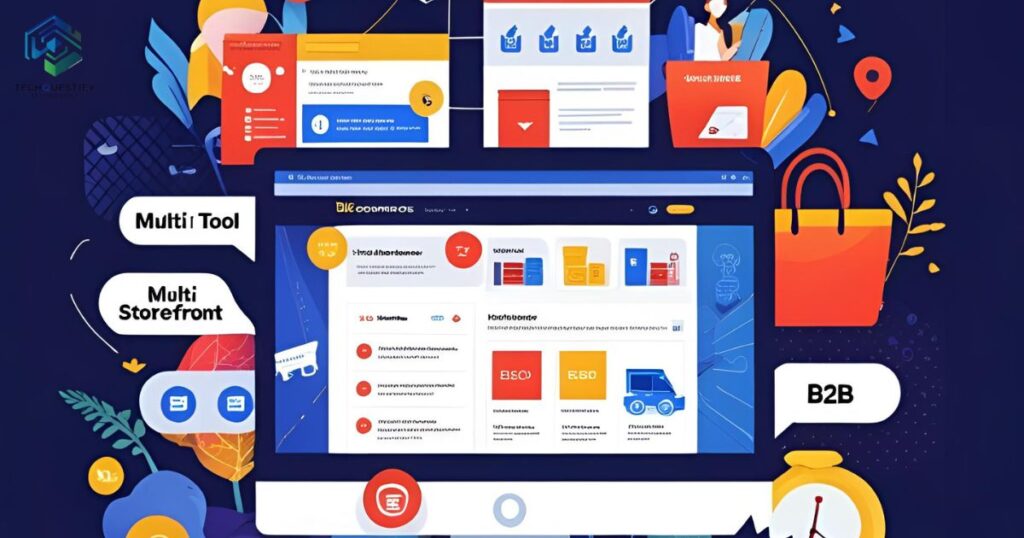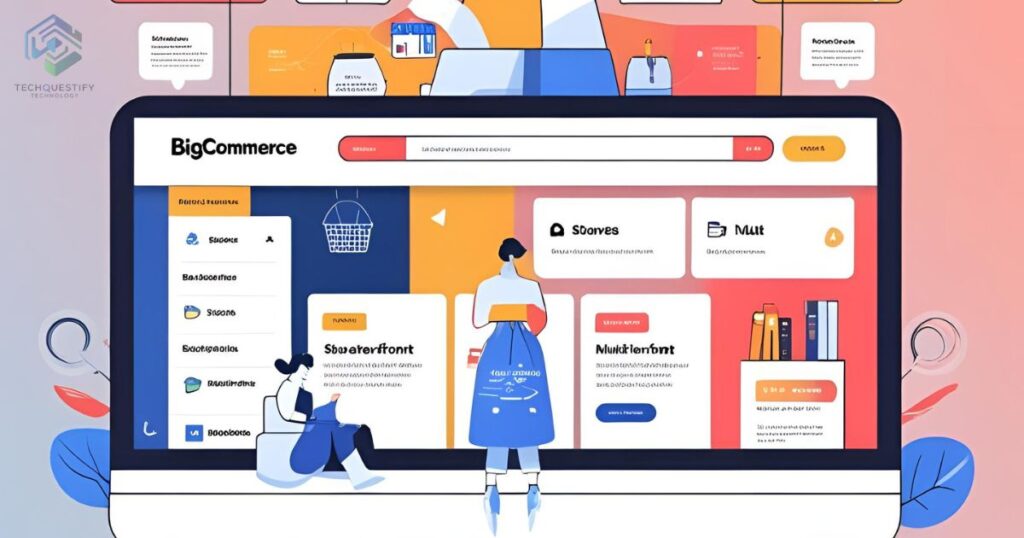In today’s fast-evolving digital marketplace, choosing the right eCommerce platform can define your brand’s success. BigCommerce has emerged as a top choice in 2025 for businesses aiming to grow online with scalable, feature-rich, and future-proof solutions. From headless commerce capabilities to seamless product catalog management, BigCommerce adapts to modern demands with powerful tools and flexibility.
whether you’re a startup or an enterprise, the platform delivers speed, SEO advantages, and robust BigCommerce integrations. Its multi-storefront architecture and built-in marketing automation help brands sell across channels without complexity. This blog explores why BigCommerce is leading the way in 2025 for US-based eCommerce businesses.
Key Features That Make BigCommerce Stand Out
BigCommerce features for 2025 are designed to give your store a competitive edge. Here are some standout features:
- Multi-Storefront Management: Run multiple brands, languages, or regional storefronts from a single dashboard.
- Headless Commerce: Front-end freedom with React, Vue, or Next.js while BigCommerce handles the backend.
- Mobile Commerce Optimization: Responsive design, mobile-friendly checkout, and AMP support.
- Abandoned Cart Recovery: Automated email sequences to recover lost sales.
- Built-in SEO Tools: Customizable URLs, metadata, schema support, and Google AMP.
- Product Catalog Management: Unlimited products, variants, and flexible merchandising.
Complete Guide: How to Set Up a BigCommerce Store in 2025
Setting up a BigCommerce store from scratch in 2025 is simpler and faster than ever:
- Sign Up: Start with a 15-day free trial.
- Choose a Plan: Select from Standard, Plus, Pro, or Enterprise based on business needs.
- Pick a Theme: Choose from free or premium responsive themes.
- Customize Your Design: Use the drag-and-drop editor or edit the HTML/CSS.
- Add Products: Include SKUs, variants, custom fields, and pricing.
- Set Up Payments: Enable gateways like PayPal, Stripe, Square, Apple Pay, and Google Pay.
- Configure Taxes and Shipping: Use automatic tax calculators and real-time shipping rates.
- Enable Marketing Tools: Connect Mailchimp, Klaviyo, and run Google Shopping ads.
- Launch Your Store: Test and go live with 24/7 BigCommerce support.

Optimizing BigCommerce for Conversions
Conversion rate optimization is vital to success. BigCommerce simplifies this with:
- Built-in A/B Testing: Test variations of pages and checkouts.
- Persistent Cart: Save user carts across devices.
- Promo Tools: Flash sales, discount codes, and BOGO offers.
- Product Swatches & Quick View: Enhance the shopping experience.
- CRM Integrations: Capture leads and personalize marketing.
BigCommerce vs Shopify vs Magento
How does BigCommerce stack up against Shopify and Magento in 2025?
| Platform | Ease of Use | Customization | B2B Support | Hosting Included | Developer Requirements |
| BigCommerce | High | High | Yes | Yes | Low |
| Shopify | Very High | Medium | Limited | Yes | Low |
| Magento | Low | Very High | Yes | No | High |
BigCommerce offers a balanced mix of customization and ease. Shopify is perfect for beginners, while Magento is for developers with large budgets.
Enterprise Features for High-Volume Brands
BigCommerce is trusted by brands like Ben & Jerry’s and Skullcandy. Enterprise-grade features include:
- Open API Architecture
- Checkout SDK
- Custom Shipping Logic
- Headless Integration with CMSs like WordPress, Contentful
- ERP Integration (e.g., NetSuite, Microsoft Dynamics)
Omnichannel Selling: Sell Everywhere From One Platform
BigCommerce allows you to reach customers wherever they shop. With multi-storefront and omnichannel capabilities, you can:
- Sync inventory across Amazon, Walmart, eBay, TikTok, Instagram, and Facebook.
- Use BigCommerce Channel Manager to control all listings.
- Consolidate customer data for consistent service.
Integrations That Power Automation
BigCommerce supports 1000+ integrations:
- Marketing: Klaviyo, Mailchimp, Omnisend
- CRM: Salesforce, HubSpot, Zoho
- Accounting: QuickBooks, Xero
- Shipping: ShipStation, EasyShip, FedEx, UPS, USPS
- ERP: NetSuite, Brightpearl
Automate workflows and sync data across platforms for a seamless experience.
SEO, Performance & Site Speed
Performance matters more than ever. BigCommerce excels with:
- Global CDN for fast load times
- Image Optimization and lazy loading
- SEO Optimization Tools including structured data
- 100% Uptime SLA (for Enterprise plans)
- Built-in blog to drive organic traffic
Inventory, Tax, Payments, and Fulfillment
Inventory management in BigCommerce is robust:
- Real-time Stock Tracking
- Multi-location Inventory Support
- Automatic Tax Rules by Region
- More Than 65 Payment Gateways
- One-Click Integrations for Fulfillment Partners
Fulfillment is streamlined with tools like ShipBob, DHL, and in-house warehouse support.

BigCommerce for B2B: The B2B Edition
The BigCommerce B2B Edition is ideal for manufacturers, wholesalers, and distributors:
- Custom Pricing for Customer Groups
- Quote Management & Negotiated Pricing
- Punchout Catalogs & Purchase Order Workflows
- Customer Portals
- Sales Rep Masquerading (log in as customer)
This edition is purpose-built to streamline large-scale transactions.
Pricing Plans & Partner Support
Plans in 2025 include:
- Standard ($39/mo): Basic features for growing brands
- Plus ($105/mo): Abandoned cart saver & segmentation
- Pro ($399/mo): Google customer reviews, faceted search
- Enterprise (Custom Pricing): Unlimited API calls, headless support, and SLAs
You also get access to a global network of certified BigCommerce partners to help with migrations, development, and performance optimization.
Final Verdict: Why Choose BigCommerce in 2025?
If you need a high-performance, scalable, and future-proof eCommerce solution, BigCommerce delivers. From advanced product management to headless flexibility and robust SEO, it’s built to help you compete in 2025 and beyond.
Whether you’re a growing DTC brand or an enterprise B2B supplier, BigCommerce offers unmatched value and freedom.
FAQs
What are the key features of BigCommerce?
- Built-in SEO tools, flexible checkout, and multi-storefront support.
- Advanced product catalog management and headless commerce capabilities.
What are the disadvantages of BigCommerce?
- Monthly pricing can be higher as you scale revenue.
- Design flexibility is slightly limited without developer help.
What does BigCommerce do?
- It helps businesses build, manage, and grow online stores with scalable eCommerce tools.
- Supports B2B and B2C models with integrations, inventory, and marketing features.
What is the difference between BigCommerce and Shopify?
- BigCommerce offers more built-in features; Shopify relies on third-party apps.
- BigCommerce is better for B2B and enterprise; Shopify is easier for beginners.
Is BigCommerce good for small business?
- Yes, especially with its easy setup, strong SEO, and scalable plans.
- Ideal for small businesses wanting to grow into mid-size or enterprise eCommerce.
Conclusion
In 2025, BigCommerce continues to prove itself as a leading eCommerce platform for businesses of all sizes. With its powerful headless commerce capabilities, built-in SEO tools, and seamless BigCommerce integrations like NetSuite ERP, it offers unmatched scalability and flexibility. Whether you’re a startup or an established enterprise, BigCommerce helps streamline everything—from product catalog management and payment gateway support to inventory management and advanced checkout customization.
Its user-friendly interface and advanced tools like abandoned cart recovery, multi-storefront management, and deep B2B ecommerce support make it ideal for both DTC and wholesale models. The ability to sell across multiple channels with its omnichannel commerce features gives merchants a true competitive edge.
For businesses aiming to thrive in today’s digital market, choosing BigCommerce is a forward-thinking move. It’s not just about selling online—it’s about scaling smartly and sustainably in a rapidly evolving world.


